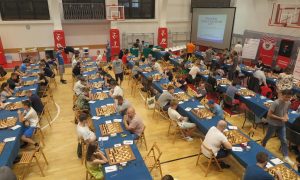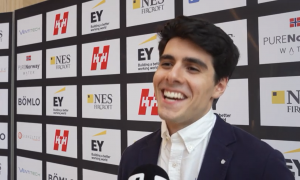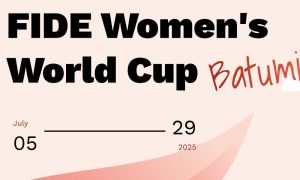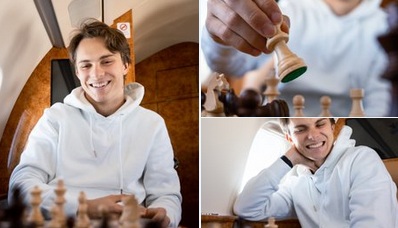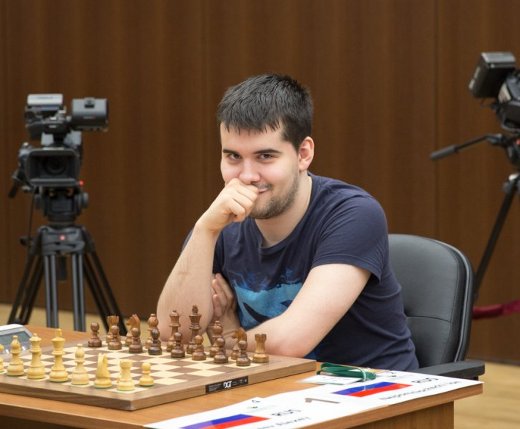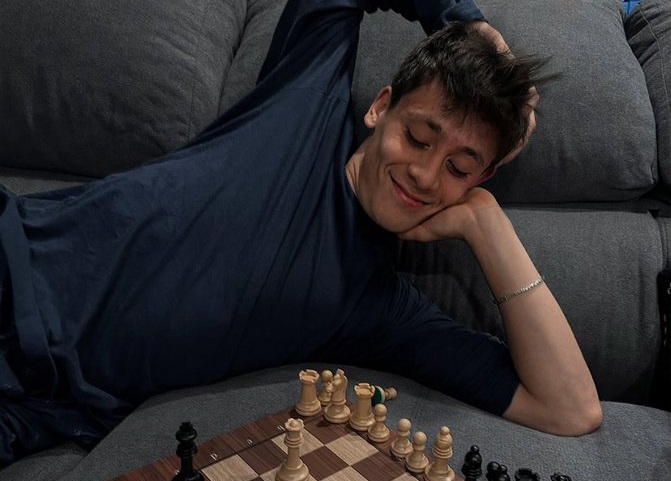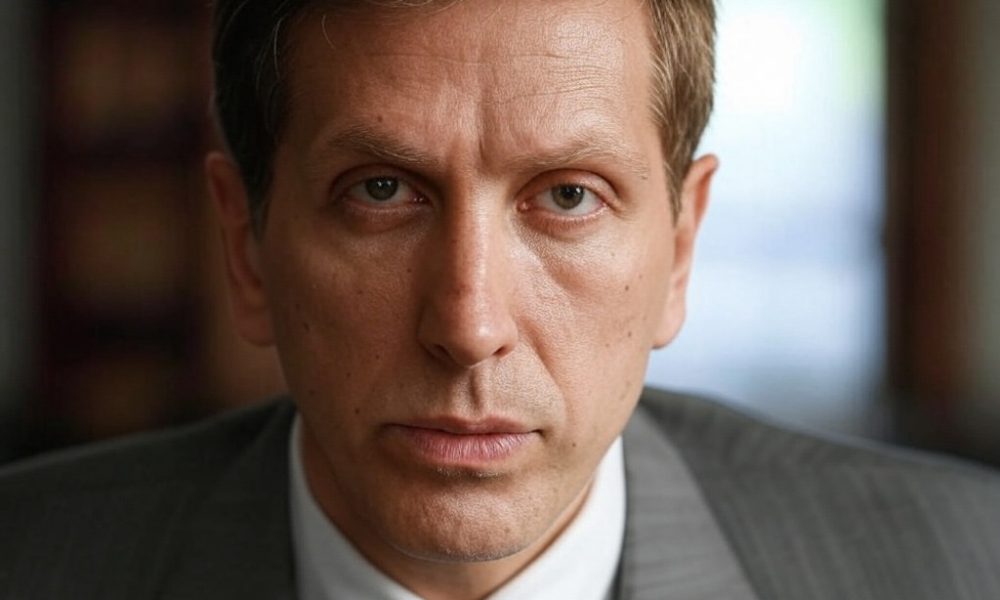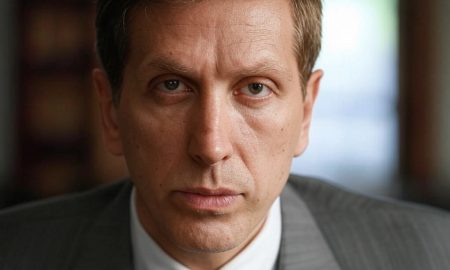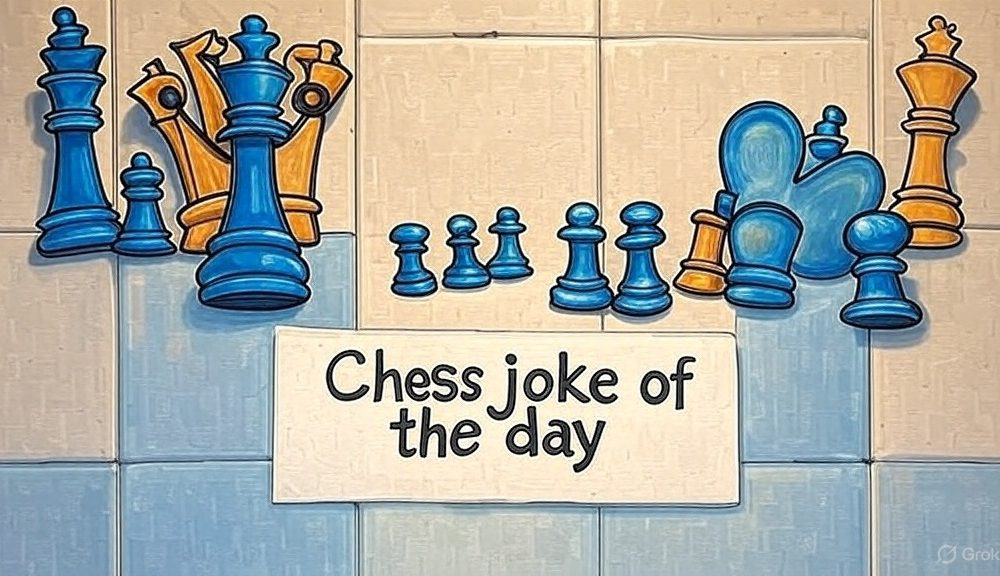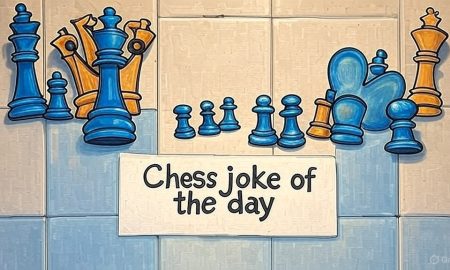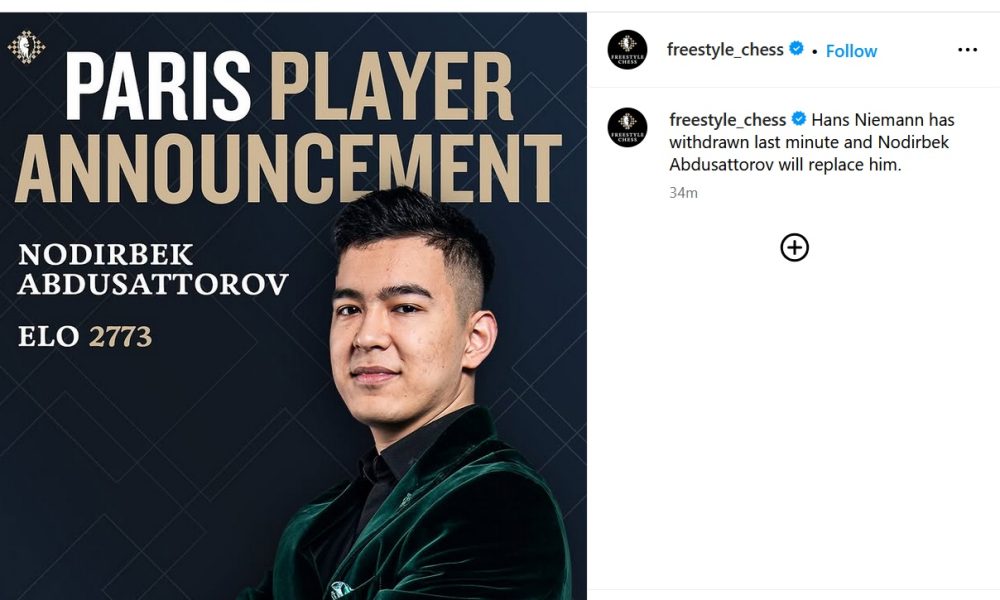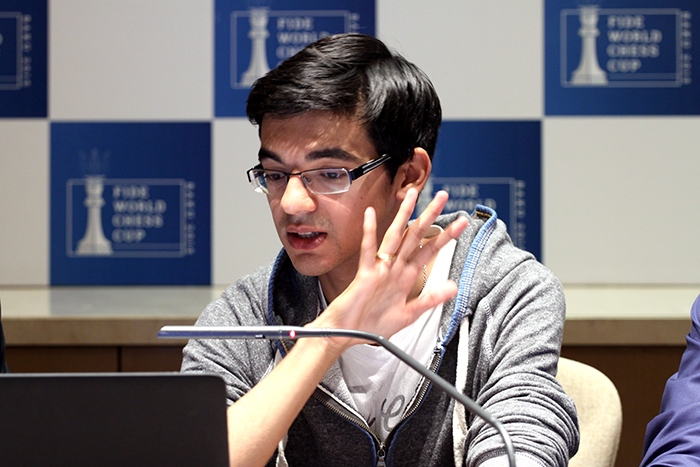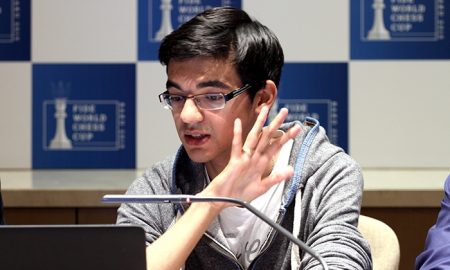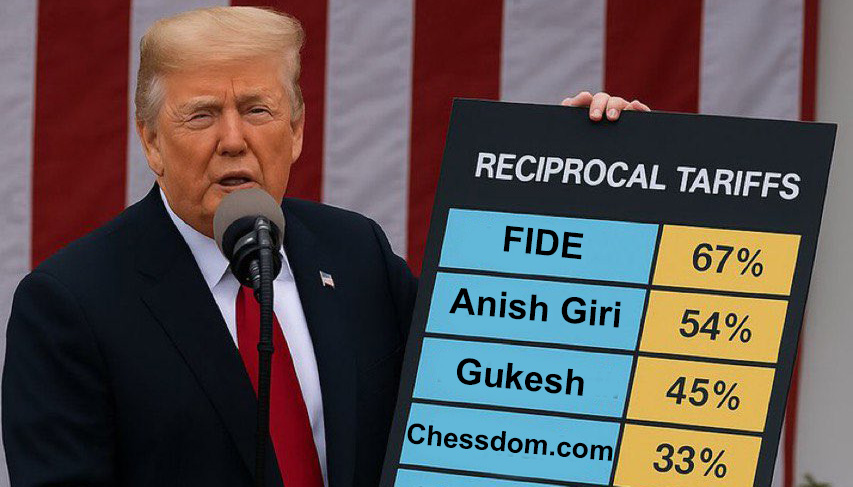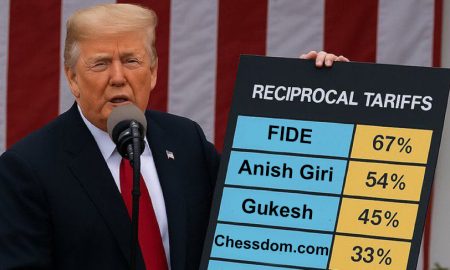Vasif Durarbayli is a highly accomplished Azerbaijani chess Grandmaster. He was born on February 24, 1992, in Sumgait, Azerbaijan, and began playing chess at the age of six. Currently, he resides in St. Louis, MO.
Durarbayli quickly showed a talent for the game, winning several national and international chess competitions as a young player. He holds the record for being the youngest player ever to represent the Azerbaijani Olympic chess team, achieving this feat at just 14 years old. To this day, his record has yet to be broken or renewed. He also won the World Youth Chess Championship U14 and the European Youth Chess Championship U18. He was awarded the title of International Master in 2007 at the age of 15 and became a Grandmaster in 2010, at the age of 18. Throughout his career, Durarbayli has competed in and won numerous prestigious chess tournaments, including the Azerbaijani Chess Championship twice (in 2021 and 2023). He was also ranked among the top 16 players in the World Cup in 2021.
Durarbayli has represented Azerbaijan in several Chess Olympiads. In addition to his successful career as a chess player, Durarbayli is a coach and mentor to chess players from diverse backgrounds. He is the author of the book ‘2021 in 52 Games’, a comprehensive guide for chess enthusiasts of all levels. Durarbayli is considered one of the top chess players in Azerbaijan and a respected figure in the international chess community.
Today Grandmaster Vasif Durarbayli publishes a long article on Azerbaijani, titled, “The Progress, Decline, and Solutions for Azerbaijani Chess: Through the Eyes of a Grandmaster”. For more by GM Vasif Durarbayli make sure to check out his official website and substack. Photo credit: official website
Recent hot topic: Major troubling issues with Fair Play by Malcolm Pein
More hot topics this month of April, when Chessdom is launching a newsletter that you get DAILY to your mailbox for FREE. Signup with your mail in the form below
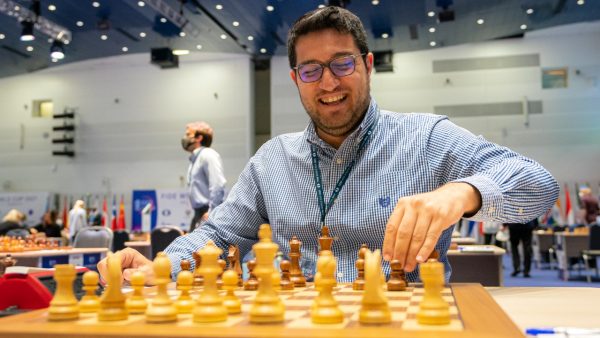
The Progress, Decline, and Solutions for Azerbaijani Chess: Through the Eyes of a Grandmaster
Introduction
On December 17, a large press conference was held to review the results of Azerbaijani chess in 2010. For the first time in Azerbaijani chess history, our country won three gold and one bronze medal at the European Championships in the 8-18 age categories, and three gold medals at the World Championships. Additionally, in 2010, Azerbaijan had three players rated above 2700 and four players above 2600. Moreover, promising new generations were emerging. The federation had everything at hand to be proud of at that moment.
It’s astonishing for a small country like Azerbaijan to achieve such success in a globally renowned sport! Our path in chess should be studied by other nations, as well as by ourselves. Furthermore, the experience gained from chess can be applied in different areas of life.
As the title of this article suggests, I am not writing to boast about our country’s successes and glorious chess history. Generally, rather than boasting about the past, it is better to learn from it. Whenever someone speaks proudly of the past, I always recall this poem by Bakhtiyar Vahabzadeh:
“In the shadow of the past,
We wanted to sleep
With our mouths wide open…
But we didn’t realize:
In the old air,
The heart suffocates.
Those who sleep in the shadow,
Lose their own shadow…”
Fourteen years have passed since that press conference. Where is Azerbaijani chess today, and where is it heading? How many medals does Azerbaijan win at the European and World Championships now? Unfortunately, the answers are not positive.
Of the three 2700-rated players I mentioned earlier, Vugar Gashimov passed away too soon, and Arkadij Naiditsch, who was brought in to fill his place, left the country (though he was already below 2700 by the time he left). Of the four 2600+ players, two—Gadir Guseinov and Nidjat Mammadov—are no longer playing professional chess and are not visible on Azerbaijan’s active rating list. As a result, in the September ranking list, Azerbaijan dropped from 5th to 11th in the world rankings. I believe this is not the end, as many of Azerbaijan’s leading chess players are aging, and the continuity of their careers is in question.
What has happened in these 14 years to bring us to this situation? Such questions are troubling chess enthusiasts.
Blaming the generational change and attributing it to the passage of time, in my view, is simply avoiding responsibility.
Before I move on to my thoughts on the causes of the decline and possible solutions, I will first discuss the factors behind the progress of Azerbaijani chess. This is what we need to learn first, and perhaps we can even repeat some of them.
Part II
Progress
I have always been amazed by how a small country like Azerbaijan has risen to such heights in chess. I would like to explain this primarily based on my own experience, what I’ve read, and what I’ve heard.
Heydar Aliyev
According to many, the progress of chess in our country is closely associated with Heydar Aliyev, who led Azerbaijan for many years. On February 22, 1998, he signed decrees providing financial support of $52,000* (in today’s value) each to Teymur Radjabov and Vugar Gashimov, and on December 18, 1998, he allocated approximately $35,000* (in today’s value) to Teymur Radjabov, Vugar Gashimov, Gadir Guseinov, and Rauf Mammadov. Furthermore, on December 18, 1998, President Heydar Aliyev personally met with these four promising young chess players. This meeting, in itself, must be considered an extraordinary event. It is rare for a country’s president to pay such personal attention to the development of a particular sport. The financial support and the meeting, where the oldest participant was only 12 years old, created fertile ground for the development of these young chess players. This step by President Heydar Aliyev not only motivated those four chess players but also the entire chess community.
In this article, I want to focus on the events in Azerbaijani chess following that meeting, but it’s also necessary to briefly mention the important steps Heydar Aliyev took for chess development during the Soviet era when he led the Azerbaijan SSR. Both in the Soviet era and during independence, Heydar Aliyev’s actions contributed significantly to chess. I believe that three major steps he took during the Soviet era were instrumental in cultivating the young talents mentioned earlier.
1. During Heydar Aliyev’s leadership in Azerbaijan (1969-1987, 1993-2003), chess schools were established all over the country. These schools supported the mass popularization of chess and made it accessible to everyone. Even families with limited financial means were able to provide chess education for their children.
2. Haydar Aliyev supported Garry Kasparov’s rise to become World Champion. Kasparov’s success showed every Azerbaijani that a world champion could come from our country. Naturally, this significantly increased interest in chess. For example, Teymur Radjabov’s father trained in the same chess club as Kasparov, which inspired him to teach chess to his son and provide comprehensive support.
3. Heydar Aliyev gifted the Republic Chess Club, located in a historic five-story building in central Baku, to chess players. This step cemented chess as an elite sport and further boosted its prestige in our country. In short, Heydar Aliyev is the primary architect of Azerbaijani chess, and the facts mentioned above confirm this.
State Support
We have already mentioned Heydar Aliyev’s support and patronage in laying the foundation for chess. Since 2003, the President of the Republic of Azerbaijan, Ilham Aliyev, has continued this care, paying special attention to the development of chess. His comprehensive decree for the development of chess, signed for the 2009-2013 period, his various meetings with chess players, and the financial support demonstrate that the state’s backing for chess continues to this day.
Azerbaijan’s Economy
In the 21st century, Azerbaijan’s economy rapidly developed. With the launch of the Baku-Tbilisi-Ceyhan oil pipeline, the influx of foreign currency into the country raised the standard of living. This enabled parents to allocate more funds for their children’s development. Parents became a strong driving force, especially in nurturing chess players. I believe parents worldwide are willing to make sacrifices for their children, but Azerbaijani parents might go a step further. They are ready to spend their last penny on their children’s development.
At the same time, many sports societies began to operate, with the Neftchi Sports Society being particularly active. At one point, all the leading chess players, including myself, were members of that society.
Republic Chess Center
The Republic Chess Center, gifted by Heydar Aliyev, truly became the center of chess in the country. Fuad Jafarov, the center’s director, organized rapid tournaments every Saturday, gathering Azerbaijan’s leading chess players. The center was always full, and various internal tournaments for children were held throughout the year. It became a place where chess players trained and socialized.
I, along with other promising kids, learned from those top chess players. Shakhriyar Mamedyarov and Rauf Mammadov were there every week. I often saw Vugar Gashimov and Gadir Guseinov there too. The only one I didn’t see was Teymur Radjabov, as he was already a superstar by then. We children gained experience while the leading players continued their training.
After Fuad Jafarov’s passing, Emin Hashimov became the director of the center, and he took the chess club to the next level. He had the center renovated, continued the Saturday rapid tournaments, and organized the first serious international tournament. In 2008, he held the President’s Cup, which remains the best open tournament in Azerbaijan’s history. Unfortunately, he didn’t stay long as director, and after his departure, the club declined.
Competition
There was intense competition among Azerbaijani chess players. The support shown to the players mentioned above and their struggle to advance in world chess increased domestic competition. Shakhriyar Mamedyarov, who wasn’t on this initial list, unexpectedly joined the race and eventually became the strongest chess player in Azerbaijan’s modern history. He and Teymur Rajabov competed for the country’s number one spot for a long time.
In 2005, we witnessed an intense match between Teymur and Shakhriyar in the final of a rapid tournament organized by Emin Hashimov. This match was supposed to determine who was the strongest. The chess community in Azerbaijan was eagerly awaiting the outcome. At that time, Teymur was still slightly stronger than Shakhriyar, and he won the match. Soon after, it seemed as though a “peace treaty” was signed between these two players, and all their encounters ended in draws. They only played when forced to. After both reached the elite level, the leadership position switched back and forth multiple times, but intense rivalry was not noticeable. I think this had a negative impact on their development.
Finally, in 2008, Vugar Gashimov joined the fight for leadership, albeit a bit late, and competed with both Teymur and Shakhriyar. There was no room for compromise in his games with them. Vugar’s entry into the competition pushed Teymur and Shakhriyar out of their comfort zones. Although Vugar initially lagged behind in skill, the gap quickly narrowed. Vugar even became Azerbaijan’s number one player for the first time on the January 2010 list and played on the first board at the World Team Championship. Although his leadership lasted only a month, his rise reignited competition, and if it had continued, our chess would have advanced even further. Unfortunately, his career ended prematurely in early 2012.
As can be seen, there was fierce competition in the country’s chess scene. And this was only among the elite. Similar rivalries continued at other levels as well. Competition is the key to progress.
Azerbaijan Chess Federation (ACF)
During the period of progress, the main figures in the federation were Faig Hasanov and Mahir Mammadov. Despite different presidents at various times, this duo has always been behind the important decisions of the federation. Although they have been criticized for their management in the press regularly, their role in the development of chess cannot be denied. Without a functioning federation, it would have been impossible for the country to reach such a high level. Of course, the ACF has also played a significant role in its decline, but here I want to focus on the period of progress.
Mahir Mammadov’s main task was to manage the financial aspect of the country’s chess scene. He took elite chess players under his direct patronage, often using “personal funds”** to strengthen them. Although there were some complaints among chess players regarding the distribution, Mahir Mammadov’s overall performance can be considered successful. He has been accessible to leading chess players and has actively participated in solving problems in many cases.
Faig Hasanov, known as the “patriarch” of Azerbaijani chess, is one of the most controversial figures in the country’s chess community. Leading chess players, including myself, have criticized him in the press numerous times. In my opinion, calling him the “patriarch” is incorrect, but nonetheless, his contributions to Azerbaijani chess have been significant.
Faig Hasanov is still serving as the vice-president of the ACF and, in certain years, has acted as the de facto manager of the country’s chess affairs. One of his greatest achievements is hosting the famous “Chess Club” TV program on the national channel of Azerbaijan. This program was an important platform for promoting and popularizing chess. The first time I appeared on that program, I was quite excited and happy. Such shows inspire, educate, and motivate young chess players. As a child, I watched that program a lot.
Faig Hasanov kept the Soviet-era system of zonal-first division-national championships in place for many years. This system allowed for increased competition in the country and provided young chess players with opportunities to gain experience.
Faig Hasanov has always been available at the ACF headquarters, listened to the problems of chess players, and often extended a helping hand.
In conclusion, both Mahir Mammadov and Faig Hasanov made significant contributions to the development of chess in the country. Especially during times when Azerbaijani chess players had not yet reached their peak, and their political influence wasn’t as strong, they were quick to respond to criticism and take steps forward.
Concluding Thoughts on Progress
As can be seen, the development of Azerbaijani chess did not happen by chance. This progress, the result of a harmonious combination of various macro and micro factors, led to an unprecedented leap in the country’s chess.
To be continued…
*I’ve shown the value of those financial aids based on an average annual inflation rate of 8% to give a clearer picture.
** Mahir Mammadov has been a state official for many years and currently works at the State Oil Company.
III Decline
The decline in Azerbaijani chess, in my opinion, began in 2007 with the appointment of Elman Rustamov as ACF president. This idea might seem surprising because most of Azerbaijan’s chess successes occurred after Rustamov’s arrival. This is a correct observation, but we must consider one thing: the progress of the country’s chess is like a moving train. Even when its energy is cut off, the train doesn’t stop immediately. Similarly, this didn’t happen in our chess. In fact, right after his arrival, Azerbaijan won a bronze medal in its first European Team Championship. As they say, Mr. Rustamov “inherited a ready situation.”
Of course, just as progress wasn’t solely the work of ACF, we cannot place the blame for chess decline entirely on this organization. However, ACF has a significant share in this.
Strong Federation President
I’m not claiming that ACF functioned at a high level during former president Aynur Sofiyeva’s time and everything deteriorated after Rustamov arrived. No. Frankly, I’m unaware of what he accomplished during his 14-year presidency (2007-2021). Despite being one of Azerbaijan’s leading chess players for many years, I saw him maybe 3-4 times in 14 years, if at all. He appeared to be someone uninterested in chess who only cared about the national team’s results.
Rustamov was the chairman of Azerbaijan’s national bank board for many years, which made him one of the country’s most powerful individuals. This itself created problems. Publicly criticizing him was a risky matter. Letters addressed to him went unanswered, and complaints about him yielded no results. After being elected president, he even abolished what were only formal elections. He never informed the public about visible works, not even once. In short, a weak federation leader was replaced by a strong but indifferent leader, and this indifference was one of the main reasons for today’s decline.
In his shadow, all management fell on the shoulders of vice-presidents Faig Hasanov and Mahir Mammadov. They, in turn, blamed all problems on Rustamov. I largely agree with this. If someone is entrusted with the presidential post, they need to fulfill it properly. Otherwise, the responsibility remains with that person, Elman Rustamov. Against the backdrop of indifference, the country’s chess successes continued on an upward trajectory for a certain period.
Criticism no longer affected ACF. Public opinion wasn’t considered in decisions. An organization that doesn’t learn from criticism cannot build its work properly, and it didn’t.
Economy and Devaluation of the Manat
The global economic crisis that emerged in 2008, although somewhat delayed, didn’t pass without affecting Azerbaijan. The support from many sports societies I mentioned in the progress section decreased. The “Neftchi Sports and Health Society” I mentioned reduced the scale of its assistance to athletes.
True, the state’s support for chess continued, but it wasn’t possible to maintain the previous level. Moreover, “the children had grown up,” and leading chess players demanded more finances. The reduction or absence of non-governmental sponsorships further complicated the situation.
The sharp devaluation of the manat against the dollar in 2015 made it difficult for parents to send their children to competitions and hire coaches. Parents had been one of the main support forces for many years and still are.
Sharp Outflow of Azerbaijan’s Chess Specialists from the Country
I don’t know exactly when the outflow began, but currently, far too many of Azerbaijan’s chess players teach chess abroad, especially in Turkey. Among them are grandmasters, international masters, and quite strong specialists. Many of them come from various regions of Azerbaijan. Today, chess is dying in those regions.
At first glance, the reason for the outflow might seem to be economic factors, but I place the blame on the directors of chess schools and the bodies overseeing them. If those specialists had been provided with better conditions, most would not have left the country.
Complacency and Neglect of Other Chess Players
During the glorious period of Azerbaijani chess, the federation, like the grasshopper in the grasshopper and ant fable, assumed this period would continue. It was content with merely boasting and focusing attention solely on the highest-ranked chess players. International masters and other grandmasters were overlooked. This led to a decrease in the number of those chess players.
Republic Chess Center
After Emin Hashimov’s departure, the center’s activities weakened. During Majid Afandiyev’s directorship (2009-2023), the weekend rapid tournaments lost their prestige, and the number of tournaments decreased. The chess center ceased being a center.
Competition
The Azerbaijan national team became an exclusive club, which was impossible to enter from the outside. This can be called both natural and artificial.
The team’s players were among the strongest not only in Azerbaijan but in the world. Even being among the world’s top 100 chess players might not be enough to enter the national team. To be able to reach the highest level required serious support, which the federation didn’t provide. Support was given only to the team’s players. This created a strange scene. Those players were already strong. Additionally, they received support, so how could unsupported chess players coming from below compete with the team members? For many years, no one could.
After a while, the national team players didn’t play among themselves and avoided participating in the Azerbaijan championship. They attributed the latter to the small prize fund, but they didn’t make serious demands for it to be increased.
Azerbaijan Championships
The zone-first division-country championship system, which I presented as Hasanov’s successful work during the progress period, collapsed. In my opinion, the main reason for the collapse was the abolition of the qualifying certificate for the national team. Subsequently, the prize fund continued to decrease year by year. Only in 2021 was an attempt made again to increase the prestige of the competition.
According to the former system, talented chess players first secured a place in the zonal tournament, qualified for the first division, and from there earned a certificate for the Azerbaijan championship. This was a huge school. Losing it didn’t pass without affecting the competition.
Children’s Olympic Chess Schools
Chess schools were merged with other sports disciplines, and some schools were completely closed. School directors could no longer devote the same attention to chess as before. Even in the past, the work of many school directors raised significant questions, but now, even a director who wants to support chess practically cannot devote attention to it. They have responsibilities toward other sports disciplines.
This is a very serious problem and is highly likely to create great difficulties for the country’s chess in the long term.
Conclusion
The issues I listed above are, in my view, the main factors affecting the decline. Of course, there are other large and small factors whose impact has also been significant. If we pay attention to the causes of the decline, it would be clear that it’s not right to look for solutions to all problems in the federation. However, in many matters, the federation could have acted more flexibly and prevented problems by pursuing the right policies.
The progress and decline sections of this article were intended to provide a historical perspective and general information about the situation so that those with little familiarity with Azerbaijani chess could understand what has happened so far.
In the next section, I will present my suggestions and solutions for improving the federation’s work.
IV Solutions
I consider Azerbaijan’s return to its 2010 world leadership level a “miracle.” The reason is simple: chess popularity worldwide has increased fivefold. Especially the full-force entry of giant countries like India has raised competition to unprecedented levels.
For example, the grandmaster title was established in 1950. Until 2010, India had only 20 grandmasters. In the last 14 years, this number has reached 65. This is not unique to India – many countries are experiencing serious growth in chess. However, India’s scale is so vast that it has changed the entire chess landscape.
We can also cite examples from neighboring countries. I was surprised to see how many International Masters were in Turkey’s delegation at the 2024 European Championship. Chess has developed incredibly in this country. Once, the Azerbaijan team expected an easy victory when facing Turkey. Now, it’s impossible to predict the outcome. In the near future, Turkey becoming the favorite seems entirely realistic.
This isn’t limited to just two countries – chess is now a globally competitive sport. Statistically, for Azerbaijan with its 10 million population, surpassing countries with much larger populations remains a difficult target.
Therefore, our goal should be to build a healthy and sustainable system for chess development by efficiently using our existing resources. Perhaps if we can accomplish this, a “miracle” will happen!
In November 2021, Mahir Mammadov, vice-president of ACF, was appointed president of the organization. With his arrival, the indifferent attitude of Elman Rustamov’s era was eliminated. President Mammadov tried to make positive changes, and certain progress was made.
For instance, the issue I raised in 2021 – the absence of the Federation’s regulations – was immediately resolved. Steps were taken in other areas as well. However, despite positive attempts, serious shortcomings remain in Mahir Mammadov’s approach.
Most importantly, he believes that all problems are related to financial shortages. That is, if more funding is allocated, all issues will be resolved. Of course, finance is an important factor. But the reality that a small country with limited resources like Azerbaijan cannot enter a financial power race in chess should not be forgotten.
This isn’t just about comparison with state-supported countries. For example, in the USA, although the federation’s support for chess isn’t that strong, parents and sponsors have extensive financial capabilities. There, talented children usually work with grandmasters. In Azerbaijan, applying this model isn’t realistic. Our resources are limited, and the correct, efficient use of every penny is vital.
ACF needs to fundamentally change its approach. Currently, the federation doesn’t share financial reports with the public. However, according to information I obtained, at the year-end event, participants were informed that the federation’s 2024 budget exceeds 3 million manats.
This is an enormous budget for a small organization like ACF. Although not such a large amount for an organization that holds year-end meetings at the country’s most expensive hotels, like the Ritz-Carlton and Marriott. The wasteful approach manifests itself in every area.
For example, in 2015 and 2023, Azerbaijan hosted both the FIDE World Cup and the 2023 FIDE Women’s World Cup. This is certainly a matter of pride. But there’s an important detail: in the 2013 and 2021 World Cups, 20% of the winners’ prizes were retained by FIDE. However, there was no such deduction in the tournaments held in Baku.
As a participant, this pleased me. But as an Azerbaijani, it raised a question: Who paid the 1 million 395 thousand manats that should have been paid to FIDE? I am convinced that we – the Azerbaijani state – covered it. There wasn’t a single post about this in either chess media or on well-known chess players’ pages, not even to say that our generous image was strengthened.
Transparency and accountability are essential in such matters. Administrators of public organizations shouldn’t spend the budget to appear generous and luxurious. Instead, with a conservative and planned approach, every penny should be used accountably and effectively.
The first step ACF should take is to end wastefulness. When each manat is spent, its result and responsibility should be considered.
The Way Forward Plan
Now I want to move on to my specific plan for the way forward. This plan covers three main directions: competition, training-education, and advocacy.
Competition
Finally, for the first time in 2025, ACF organized a country championship with the participation of Azerbaijan’s strongest chess players. Technically, this was a cup. The cup is memorable for its intensity, but it doesn’t create favorable conditions for young people to gain experience. For inexperienced chess players, the competition usually ends in the first round. Therefore, it’s advisable for the country championship to be in a round-robin format. Although an additional Azerbaijan Cup could also be held alongside the country championship, which would be interesting.
Proposed model:
- The country championship should be held with a 12-person round-robin system.
- The top 9 players by rating should participate directly.
- The other 3 places should be given to the best from the first division tournament.
- Only players with a rating of 2200+ should be able to enter the first division.
- The top 5 places in the Baku championship and Zonal tournament should qualify for the first division.
- The schedules for all these tournaments should be announced at least 6 months in advance and provided with adequate prize funds corresponding to their names.
2. Clubs Championship
An Inter-Club Chess Championship should be created in Azerbaijan. This championship can be organized in two divisions – upper and lower.
The team composition could be:
- 3 main players
- 1 female chess player
- 1 youth (U20)
- 1 child (U16)
- The right to play 1 foreign player in each match
If the federation allocates sufficient prize funds for this tournament, teams will form on their own in a short time, and a serious chess environment will develop within the country. Thus, conditions will be created for friendliness and experience sharing among the country’s chess players.
3. Tournament Organization and Support System
ACF should cease its function of organizing open tournaments. The Baku Open tournament, held since 2009 and shrinking each year, showed that the federation cannot effectively organize open tournaments.
For this reason, ACF’s plan to hold 8 open tournaments in 2025 is a wrong step.
Instead, the federation can build a system based on FIDE’s model. Here, a support mechanism for private organizers can be created:
- ACF can allocate a certain amount from its budget for these tournaments
- Criteria should be established for tournaments to receive support
- ACF’s support should not exceed 20% of the prize fund
- Additionally, organizational support can also be provided (referees, equipment, PR, etc.)
If these 3 models work correctly, a competitive environment will emerge, and finance will be directed straight to chess players. This will increase their opportunities for both tournament participation, welfare, and hiring coaches.
4. Training-Education
Due to years of neglect and inattention in Azerbaijan, numerous chess specialists have left the country. Real initiatives should be shown to bring them back.
Currently, there is a shortage of specialists in the country. In particular, experienced chess players from the regions have either gone abroad or moved away from chess.
This isn’t just about high-titled chess players. Contact should be established with chess teachers who have trained students and proven themselves, have potential, and conditions should be created for their return to the country, to chess, and to work in the regions.
Chess Center
ACF currently spends funds to rent an office in the center of Baku. However, these funds could be directed towards creating and commissioning a Chess Center.
This center could be located on the outskirts of the city or in other cities. Functionality, not the location’s position, is important.
The center could consist of the following sections:
- Study rooms – for classes and seminars
- Medium-sized hall – for competitions and events
- Office section – for the federation employees’ activities
These listed are sufficient for the beginning. The center could become a training, tournament, and socialization center for chess players. At the same time, ACF would be in constant contact with players here, sensing problems more quickly.
Advocacy
ACF should protect chess players’ rights. For example, when good coaches weren’t attracted to district schools, when state chess schools in the country were merged with physical sports, when half of the Republic Chess Center (Club) was sold and turned into Mothercare, it made almost no serious noise. Meanwhile, I fear that the other half of the Club will become Fathercare.
In general, the number of people in the federation who love chess, understand chess players, and know the work is small. It might be that the first step of the way forward should start right here – by changing the federation’s human resources.
If there are no conscientious, educated, and experienced people within the organization, no matter how many structures are built, the essence of the system will not change.
Final Word
This article is written through the eyes of a grandmaster, me, Vasif Durarbayli. We should not only be proud of the past – we should learn from the past and build the future.
I believe that if the reforms I presented in this article are realized, Azerbaijan will once again take its deserved place on the world chess scene. For this, a fundamental change in ACF is necessary.
If we can do these things, perhaps what I call a miracle will simply be the result of a properly built system.

